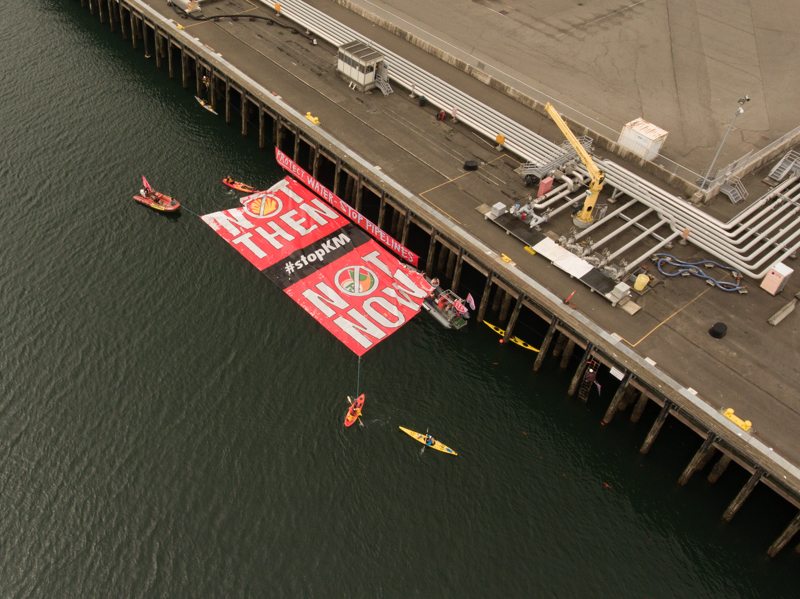UPDATE as of 5:00pm PST
Seattle, Washington—The activists who stopped an oil barge from entering into Kinder Morgan’s Harbor Island facility have left the blockade. The activists were protesting Kinder Morgan’s Trans Mountain pipeline expansion which would increase tar sands tanker traffic in Washington waters by seven fold.
Photos from the protest can be found here:
https://www.flickr.com/photos/greenpeaceusa09/albums/72157696831390185
https://media.greenpeace.org/collection/27MZIFJX50GBI
Live blog of the protest here:
https://www.greenpeace.org/usa/stopkm-seattle/
Greenpeace USA and Mosquito Fleet led today’s actions in protest of Kinder Morgan’s Trans Mountain expansion project. In addition to two activists physically locked down at the Kinder Morgan facility, local kayaktivists next to the facility deployed a 32 feet by 74 feet water banner that reads “NOT THEN” with a Shell Oil logo, and “NOT NOW,” with the Trans Mountain logo. This action comes as Canadian Prime Minister Justin Trudeau doubled down today on his support for the pipeline by saying it’s “imperative” for the Canadian economy.
“Kinder Morgan desperately wants certainty ahead of their May 31 deadline for their Trans Mountain pipeline expansion, but the only certainty they’ll get is more resistance like they saw today,” said Greenpeace USA tar sands campaigner Rachel Rye Butler.
###
FOR IMMEDIATE RELEASE May 15, 2018
Seattle— Greenpeace USA and Mosquito Fleet activists blocked an oil barge from entering Kinder Morgan’s Seattle facility by locking themselves to the pier. In addition to the blockade, local kayaktivists next to the facility have deployed a 32 feet by 74 feet water banner that reads “NOT THEN” with a Shell Oil logo, and “NOT NOW,” with the Trans Mountain logo.
https://twitter.com/
Follow live updates:
https://twitter.com/
http://www.facebook.com/
“Kinder Morgan’s Trans Mountain pipeline tramples Indigenous rights, threatens communities and their access to clean water, and the increased tanker traffic from the pipeline could decimate marine wildlife including the 76 remaining Southern Resident orcas,” said Greenpeace USA activist and Seattle resident Samantha Suarez. “Taking action today is my responsibility so that the next generations know what an orca looks like. We have to stand up to these companies and say enough is enough.”
Today’s action comes only two weeks before Kinder Morgan will determine if it will continue with its Trans Mountain expansion project and against the backdrop of overwhelming momentum for the Indigenous-led movement against pipelines. Kinder Morgan and other companies like TransCanada and Energy Transfer Partners continue to face protests, negative press, delays, and lawsuits.
This week also marks the three year anniversary of the Paddle in Seattle protests against Shell Oil’s drilling in the Arctic.
“We’re taking action today to protect our waters, our communities, and our climate from Kinder Morgan,” said Mosquito Fleet kayaktivist and local resident Kara Sweidel. “This is just the beginning. As long as they pursue this pipeline, Kinder Morgan has nowhere to hide. We’re here to show investors and policy makers alike that this project is toxic, and it will be met with increasing resistance on both sides of the colonial border.”
If Kinder Morgan expands the Trans Mountain pipeline as planned, Washington waters will see a seven-fold increase in tar sands shipments, resulting in a tanker superhighway down the West Coast. This increased tanker traffic threatens the endangered Southern Resident orca, of which only 76 remain.
“I was born into this responsibility of putting my body on the line for environmental and social justice,” Reginald J R Gillins Jr., Greenpeace activist and Seattle resident, sad. “People of color experience the effects of fossil fuel projects like Kinder Morgan’s Trans Mountain expansion first. I am protesting at Kinder Morgan facility in solidarity with Coast Salish folks right here in Seattle, but also all over the world who will be impacted by the reckless plans of companies like Kinder Morgan.”
Kinder Morgan has faced a wave of negative press and protests of its Trans Mountain expansion project including the “Shutdown Chase” direct action last week in front of the Russell Investment Center in Seattle, part of a nationwide protest of Chase Bank’s funding of tar sands pipelines. During the bank’s annual shareholder meeting this morning in Texas, a global delegation of Indigenous and frontline communities protested Chases’ funding of tar sands pipelines including Kinder Morgan’s Trans Mountain expansion. Greenpeace is asking twelve “dirty dozen” banks around the world, including Chase, to stop funding tar sands pipelines and stop funding Energy Transfer Partners, the company behind the Dakota Access pipeline, suing Greenpeace and others for $900 million dollars. This Sunday, May 20th, hundreds of people from across Washington and Oregon will hold a mass day of action, in Seattle, to protest the pipeline with a rally at Occidental Park and a kayaktivist flotilla surrounding Kinder Morgan’s facility.
###
Follow live updates:
https://twitter.com/
http://www.facebook.com/
For interviews with the activists:
Cassady Craighill, 828-817-3328
For additional updates and visual requests:
Travis Nichols, [email protected], 206-802-8498
Yianni Varonis, [email protected], 330-806-3599
Photos will be here, when available:
https://www.flickr.com/photos/

